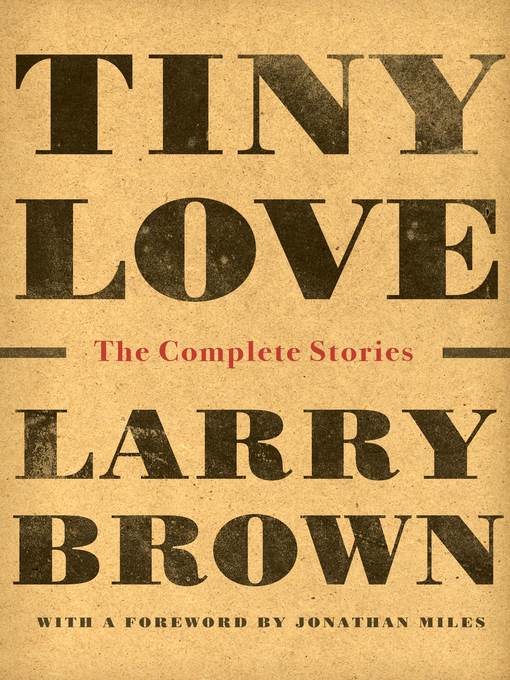
Tiny Love
The Complete Stories
کتاب های مرتبط
- اطلاعات
- نقد و بررسی
- دیدگاه کاربران
نقد و بررسی

September 1, 2019
A career-spanning collection by a master of American realism. When he decided to become a writer in 1980, Brown (A Miracle of Catfish, 2007, etc.) was a 29-year-old father, husband, and firefighter; he had never written fiction before. Fifteen years after his death, this sweeping collection charts Brown's progress from tyro to master. It begins with "Plant Growin' Problems," Brown's first publication, which appeared in Easyriders (yes, the motorcycle magazine) in 1982. The story is nothing special on its own--chronicling a marijuana-farming motorcyclist's cartoonishly fateful run-in with a crooked sheriff--but, fascinatingly, it contains trace levels of the complicated humanism that characterizes Brown's later work. In his debut collection, Facing the Music (1988), Brown is visibly casting around for his proper form. "Boy and Dog," for example, is composed entirely of five-word sentences (e.g. "The dog was already dead") and reads like an experiment. "The Rich," meanwhile, set in a travel agency, is a language-driven social satire: "The rich often wear gold chains around their necks. Most of the rich wear diamond rings. Some of the rich wear gold bones in their noses. A lot of the rich, especially the older rich, have been surgically renovated. The rich can afford tucks and snips." In between these experiments, however, Brown explores topics like alcoholism, infidelity, codependence, pity, shame, and emotional hypocrisy--topics that recur in his second collection, Big Bad Love (1990), and in the uncollected stories he wrote later. Some readers will be put off by Brown's female characters, many of whom are appreciated (or not) for their sexual appeal (or perceived lack of it); others will be put off by the casual racism expressed by the otherwise positively portrayed (even idealized) World War II veteran at the center of "Old Soldiers." Distasteful though some elements of Brown's fiction can be, these contradictions--that certain men, desperate to be loved by women, can only notice them for their bodies; that a beloved father figure can also house within him unpardonable biases--are a collateral aspect of Brown's chief strength as a fiction writer: He is intensely compassionate, and he extends this compassion to everyone; this includes the cruel sheriff in "Plant Growin' Problems"; it includes the mentally disturbed genital flasher in the heartbreaking "Waiting for the Ladies"; it includes men and women--in "Kubuku Rides (This Is It)," in "Tiny Love," in "Wild Thing"--who, in their lonely and self-destructive love for the bottle, systematically erode their connections to the only people in the world who love them. Compassionate and gritty and lyrical--a master class.
COPYRIGHT(2019) Kirkus Reviews, ALL RIGHTS RESERVED.

September 23, 2019
The complete stories of Brown (1951–2004) are collected in this outstanding, capacious volume. A writer that takes readers to the darkest and strangest corners of the Deep South, Brown peers into the lives of the broken, eccentric, and desperate. In stories including “Tiny Love,” where a man’s obsessive love for his wife leads to a distraction causing maiming at the steel stamping plant where he works, and “Leaving Town” where a woman leaves her infants alone in the house to hang out at the bar, Brown looks at the strangest forms of love. A woman drives her dying husband miles along the back roads of Mississippi to hunt down a famous faith healer, only to be stopped by the highway patrol who discover her dead husband strapped into the front seat in “A Roadside Resurrection.” Another woman gets flashed when taking out the garbage in “Waiting for the Ladies,” and her husband follows the flasher to his home to kill him. In bars, run-down shacks, and dark corners of the Mississippi forests and swamps, Brown’s characters drown in alcohol while struggling to escape isolation, distorted relationships, and failed dreams. There are also angst-filled stories heavy with the struggles and failures of writers. In “92,” an author drinks himself into oblivion as he continues to receive rejection after rejection from publishers. In “Discipline,” Brown imagines writers in a prison camp for plagiarizers with guards as editors. Whether exploring the underbelly of love or the despair of editorial rejection, Brown’s stories drip with often uncomfortable detail as he describes the crass, the ugly, and the broken in ways unique and captivating.

October 15, 2019
Acclaimed novelist and short story writer Brown, who died in 2004 at the pinnacle of his creative powers, spent decades honing his distinctive precise lyricism. The result is this career-spanning collection which includes the stories from Facing the Music (1988) and Big Bad Love (1990) as well as previously uncollected work. Brown's fiction shows the early influences of authors he read voraciously, including Flannery O'Connor, Charles Bukowski, and Cormac McCarthy, but his own style emerged during his evolution as a writer who eventually set up shop near the intersection of Carver and Faulkner. A native Mississippian, Brown worked many odd jobs, including a 17-year stint as a firefighter, and this experience finds its way into his work, detailing the lives of hard-drinking, hard-luck characters who hang out in roadhouses, trailer parks, and strip joints. Threads of humor and grace run through the tales of violence, infidelities, and alcoholism, masterfully introducing an unexpected compassion. Brown excels at capturing psychological complexity with spare, humane prose in an original voice that was sadly lost to us far too soon.(Reprinted with permission of Booklist, copyright 2019, American Library Association.)

























دیدگاه کاربران